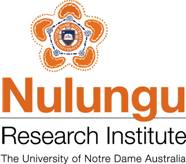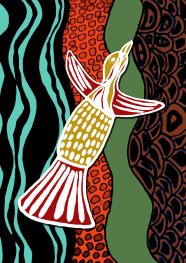The Nulungu Research Papers series provides an avenue for Aboriginal people and collaborators working in the Kimberley region of Western Australia with an opportunity to publicly inform, discuss and present their activities and research. Publishing original works pertaining to the breadth of issues Aboriginal people face in the region, Nulungu Research Papers offers academics a place to communicate their endeavours which are guided by the Nulungu Way - respecting the traditions of the past that underpin contemporary community actions to create a better future for the people of the Kimberley and beyond. Contributions are peer reviewed, and are aimed at audiences within the community, organisations or government networks.
Artwork: Seeing Country by Nyapuru Laurel
-

A systematic review of self-reported ethical practices in publications of cluster randomised trials conducted in Aboriginal and Torres Strait Islander settings
Jeanette Ward, Seham Girgis, Kathryn Thorburn, Stefanie Oliver, Charles Weijer, and Monica Taljaard
Cluster randomised trials (CRTs) present unique ethical complexities for research ethics committees, participants, researchers and evidence users. In this design, whole social units (‘clusters’) such as hospitals, schools or entire communities are randomised to interventions. In addition, units of randomisation, intervention and outcome measurement differ within the one study. As a consequence, clearly determining research participants and establishing whose consent is required not only for randomisation and interventions but also data collection are correspondingly difficult.
This systematic review describes self-reported ethical practices in research conducted in Australia in which social units comprising Aboriginal and Torres Strait Islander people, their communities or services upon which they rely were randomised as whole clusters to trial interventions. To undertake this systematic review, we developed a study protocol and registered it prospectively on a public database (PROSPERO1 protocol CRD42018106463). Applying this protocol meant we could methodically identify all CRTs conducted in Aboriginal and Torres Strait Islander settings in Australia by finding their peer-reviewed study protocols or articles with main results reporting primary outcomes.
-

Scaling up: Renewable energy on Aboriginal lands in north west Australia
Brad Riley
This paper examines renewable energy developments on Aboriginal lands in North-West Western Australia at three scales. It first examines the literature developing in relation to large scale renewable energy projects and the Native Title Act (1993)Cwlth. It then looks to the history of small community scale standalone systems. Finally, it examines locally adapted approaches to benefit sharing in remote utility owned networks. In doing so this paper foregrounds the importance of Aboriginal agency. It identifies Aboriginal decision making and economic inclusion as being key to policy and project development in the 'scaling up' of a transition to renewable energy resources in the North-West.
-

Kimberley transitions, collaborating to care for our common home: Beginnings…
Sandra Wooltorton, Sandy Toussaint, Anne Poelina, Anne Jennings, Stephen Muecke, Kevin Keneally, Jacqueline Remond, Arjati Schipf, and Louisa Stredwick
This scoping paper is a preliminary introduction to the aspirations, interrelated literature and research involved in development of the Kimberley Transitions Project. Our focus is on Western Australia’s Kimberley region, a landscape of immense natural and cultural significance. Along with the rest of Australia, and indeed the world in which we all live, the Kimberley is on the verge of major climate, political, social and economic change. The direction of changes being proposed by governments and industry are regularly criticised, both globally and locally, by individuals and organisations concerned about damage to its rich biodiversity and cultural integrity. With the aim of collaboratively generating Kimberley-based responses grounded in local knowledges, a mix of disciplines and emerging international theories, scholars and relevant groups have come together to form a Kimberley-wide practical and shared research agenda. One of the key influences behind the project is an international transitions movement which aims to generate collaborative change incorporating a process of transition. Locally identified issues using local knowledges and capacity are central to its evolution. A conceptual and theoretical framing known as ‘transitions discourse’ is also emerging internationally and nationally, one that foregrounds diverse epistemologies and challenges mainstream economics and associated ideologies, such as neoliberalism. Via the Kimberley Transitions project, Kimberley-based researchers and collaborators aim to support and further document social, cultural and economic change inspired by the transitions movement and informed by transition discourses. It has the Kimberley landscape and people at its heart; a transformative approach featuring cultural healing, intellectual rigour and an ethos aimed at enduring, practical and interconnected sustainable outcomes.
-

Climate change and adaptation on Karajarri Country and ‘Pukarrikarra’ places
Anna Dwyer
I am a Karajarri woman and one of the Traditional Owners of Karajarri Country. I come from Bidyadanga Aboriginal Community which is on Karajarri Country, approximately 190 km south of the township of Broome in the Kimberley region of Western Australia. I am a linguist, interpreter and researcher at the Nulungu Research Institute, located on the Broome campus of the University of Notre Dame Australia, on Yawuru Country. I am often required to bring together traditional knowledge and Western rationalist approaches to knowledge generation in my research endeavours. The aim of the project described in this paper was to explore people’s concerns around climate change on Karajarri Country. It reflects on my cultural background, knowledge, traditional language and beliefs concerning changes to Country caused by changing climate. It also includes the ways my people adapt to changes to Country. During the research, Karajarri People talked about the importance of culture and heritage, and the importance of protecting Karajarri ‘Pukarrikarra’ (dreaming) places from changes to the land and waters. The importance and connectedness of language to Country is highlighted, and the significance and value of Country is demonstrated through our spiritual understandings and cultural practices, especially around climate change on Karajarri Country.





